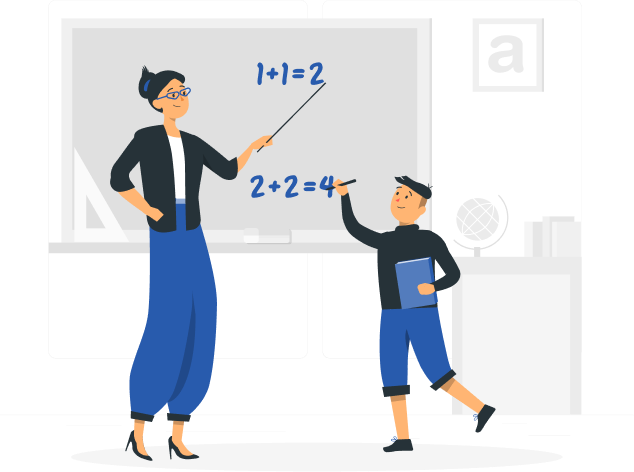— 60110600 —
General description of the undergraduate program of mathematics and computer science

A student of mathematics and informatics must collect 30 credits per semester and 60 credits per academic year. The duration of study is 4 years, and the student must complete 240 credits before completing the program.
A student of mathematics and informatics must collect 30 credits per semester and 60 credits per academic year. The duration of study is 4 years, and the student must complete 240 credits before completing the program.
60110600 – Education field of mathematics and informatics– subjects, means of pedagogical activity, methods, methods used in the process of pedagogical personnel in the field of undergraduate education for general secondary schools, secondary special, vocational educational institutionsi; To engage in scientific and pedagogical research works in network research institutes of the Ministry of Public Education of the Republic of Uzbekistan and the Ministry of Higher and Secondary Special Education and as an independent researcher;
60110600 – Types of professional activities of graduates of mathematics and informatics:
- – teaching mathematics and informatics in the established order in general secondary education, secondary special, vocational educational institutions;
- – work in educational institutions as cabinet manager, laboratory assistant and equivalent positions;
- – to work as a methodologist in the field of mathematics and informatics in the ministries that carry out education in the appropriate educational areas, their branch departments and institutions;
- – working as a junior researcher in scientific and research organizations in the field of natural sciences;
- – work in local self-government bodies and local centers of spirituality and enlightenment;
- – development and implementation of pedagogy and technology of professional education, didactic teaching tools in production areas;
Graduates of the field of mathematics and informatics can continue their studies within the specified period of time in master’s specialties determined by the Ministry of Higher and Secondary Special Education of the Republic of Uzbekistan.
I academic year / 1st semester
| Subject code | Qualification code | Subject name | Hour | Credit | Selection type |
|---|---|---|---|---|---|
| 1.01 | 351FalM04 | Philosophy | 120 | 4 | Compulsory |
| 1.04 | 351XTM08 | Foreign language | 120 | 4 | Compulsory |
| 1.05 | 351O’EYTM04 | The newest history of Uzbekistan | 120 | 4 | Compulsory |
| 1.15 | 351MaM08 | Mathematics analysis | 120 | 4 | Compulsory |
| 1.18 | 351ASM10 | Algebra | 180 | 6 | Compulsory |
| 1.19 | 351AKM12 | Geometry | 120 | 4 | Compulsory |
| 1.21 | 351INAM04 | Theoretical foundations of computer science | 120 | 4 | Compulsory |
| Total: | 900 | 30 |
I academic year / 2nd semester
| Subject code | Qualification code | Subject name | Hour | Credit | Selection type |
|---|---|---|---|---|---|
| 1.02 | 351ManM02 | Spiritual science | 60 | 2 | Compulsory |
| 1.03 | 351O’RTM04 | Uzbek language | 120 | 4 | Compulsory |
| 1.04 | 351XTM08 | Foreign language | 120 | 4 | Compulsory |
| 1.05 | 351YFGM1004 | Physiology of youth. Ecology | 120 | 4 | Compulsory |
| 1.15 | 351MaM08 | Mathematical analysis 1 | 120 | 4 | Compulsory |
| 1.18 | 351ASM10 | Algebra | 120 | 4 | Compulsory |
| 1.19 | 351AKM12 | Geometry | 120 | 4 | Compulsory |
| 1.22 | 351KTM04 | Computer support | 120 | 4 | Compulsory |
| Total: | 900 | 30 |
II academic year / 3rd semester
| Subject code | Qualification code | Subject name | Hour | Credit | Selection type |
|---|---|---|---|---|---|
| 1.07 | 351FizM04 | Physics | 120 | 4 | Compulsory |
| 1.08 | 351UmPsixM08 | General psychology | 120 | 4 | Compulsory |
| 1.13 | 351SNM04 | Number theory | 120 | 4 | Compulsory |
| 1.16 | 351MAIM04 | Mathematical analysis 2 | 120 | 4 | Compulsory |
| 1.20 | 351DGTM04 | Differential geometry and topology | 120 | 4 | Compulsory |
| 1.23 | 351DTMI0 | Programming languages | 180 | 6 | Elective |
| 2.02 | 351EM04 | Elementary mathematics | 120 | 4 | Elective |
| Total: | 900 | 30 |
II academic year / 4th semester
| Subject code | Qualification code | Subject name | Hour | Credit | Selection type |
|---|---|---|---|---|---|
| 1.08 | 351UmPsixM08 | General psychology | 120 | 4 | Compulsory |
| 1.11 | 351MO’TLM04 | Mathematics teaching technologies and design | 120 | 4 | Compulsory |
| 1.14 | 351SHUM04 | Numerical calculation methods | 120 | 4 | Compulsory |
| 1.23 | 351DTMI0 | Programming languages | 120 | 4 | Compulsory |
| 1.24 | 351MO’MM08 | Mathematics teaching methodology | 120 | 4 | Compulsory |
| 1.32 | 351KGWDM04 | Computer graphics and web design | 120 | 4 | Compulsory |
| 2.00 | Elective subjects | 120 | 4 | Elective | |
| Qualification and pedagogical practice | 60 | 2 | Compulsory | ||
| Total: | 900 | 30 |
III academic year / 5th semester
| Subject code | Qualification code | Subject name | Hour | Credit | Selection type |
|---|---|---|---|---|---|
| 1.09 | 351UmPedM08 | General pedagogy | 120 | 4 | Compulsory |
| 1.13 | 351XBTM04 | International assessment systems (PISA, TIMSS, TALIS) | 120 | 4 | Compulsory |
| 1.17 | 351DTM04 | Differential equations | 120 | 4 | Compulsory |
| 1.24 | 351MO’MM08 | Mathematics teaching methodology | 120 | 4 | Compulsory |
| 1.26 | 351TT06 | Network technologies | 180 | 6 | Elective |
| 2.00 | Elective subjects | 240 | 8 | Elective | |
| Total: | 900 | 30 |
III academic year / 6th semester
| Subject code | Qualification code | Subject name | Hour | Credit | Selection type |
|---|---|---|---|---|---|
| 1.08 | 351UmPedM08 | General pedagogy | 120 | 4 | Compulsory |
| 1.12 | 351KMM08 | Computer modeling | 120 | 4 | Compulsory |
| 1.25 | 351IO’M04 | Methodology of teaching chemistry at school | 120 | 4 | Compulsory |
| 1.28 | 351KMT06 | Computerized mathematical systems | 180 | 6 | Compulsory |
| 2.00 | Elective subjects | 240 | 8 | Elective | |
| Qualification and pedagogical practice | 120 | 4 | Compulsory | ||
| Total: | 900 | 30 |
IV academic year / 7th semester
| Subject code | Qualification code | Subject name | Hour | Credit | Selection type |
|---|---|---|---|---|---|
| 1.12 | 351KMM08 | Computer modeling | 120 | 4 | Compulsory |
| 1.27 | 351MBM06 | Database | 180 | 6 | Compulsory |
| 1.30 | 351FAM04 | Functional analysis | 120 | 4 | Compulsory |
| 1.31 | 351enmsm04 | Probability theory and mathematical statistics | 120 | 4 | Compulsory |
| 2.00 | Elective subjects | 360 | 12 | Elective | |
| Total: | 900 | 30 |
IV academic year / 8th semester
| Subject code | Qualification code | Subject name | Hour | Credit | Selection type |
|---|---|---|---|---|---|
| 2.09 | 351MPA26 | Qualification and pedagogical practice | 780 | 26 | Compulsory |
| 2.10 | 351YDA04 | Final state certifications | 120 | 4 | Compulsory |
| Total: | 900 | 30 |
The goals and tasks of science
The purpose of the subject is to deeply teach future teachers of mathematics and informatics the most important theoretical principles in mathematics and informatics, to provide students with knowledge that meets the state educational standard and qualifications, to demonstrate the educational and educational importance of teaching by expressing his personal attitude to the whole process from a mathematical point of view, relying on the real life of each subject, implementation of career guidance through in-depth coverage of issues related to mathematics and informatics courses in schools, academic lyceums and vocational colleges.
The task of science — on the basis of the National Personnel Training Program, as well as in-depth observation of mathematics and informatics science calculation issues, since the possibility of obtaining a clear and concrete solution is very high, during the period of its study, mathematics and informatics theoretical knowledge, mathematics ability to work with measuring instruments and computer programming languages, computer maintenance, to be aware of modern computer systems, especially computer mathematical systems, to conduct various experiments with their help, to create animations, to be able to create visualizations, to be able to analyze educational literature, to be able to perform calculations with mathematics and informatics formulas and equations and qualifications are required.


What knowledge and skills the student will have at the end of the course?
- -historical stages of the formation and development of mathematics and computer science;
- -further advances in mathematics and computer science;
- – to have knowledge of theoretical issues of mathematics and informatics, including applied mathematics, functional analysis, probability theory;
- – development and general description of the concept of integration of mathematics and informatics;
- – having the competence to teach school and AL mathematics classes based on new methods based on mathematics and informatics;
- – having knowledge of mathematical analysis, geometry, algebra and number theory;
- – to get acquainted with the teaching methods of the Cambridge and Finnish educational systems and to have the ability to learn to adapt them to the education of Uzbekistan;
- – familiarity with computer mathematical systems and being able to analyze them;
- – to be able to use modern information technologies in education and to introduce elements of modern methodology into education based on them;
- – to have programming languages and programming skills based on them;
- – computer servicing;
- – determining the appropriate place of general mathematics and computer science in society;
- – to practice the acquired theoretical knowledge, i.e. to perform laboratory work;
- – must have professional competencies.

Brief description of science:
mathematics and computer science is intended for undergraduate students of mathematics and computer science, introduction to mathematics and computer science, history of the development of general mathematics and computer science and the development of mathematics and computer science in Uzbekistan, basic concepts of mathematics and computer science and laws, the science of mathematics teaching methodology, digital technologies in science, programming languages, the latest programming languages and knowing how to program with them, thoroughly studying computers and providing them with technical service, modern theories, familiarization with computer mathematical systems that integrate mathematics and informatics and being able to apply them to the teaching process, numerical method, mathematical analysis, geometry, algebra and number theory, probability theory, basic theories are described in a certain consistency. Thorough mastering of science, along with knowledge of theoretical materials, serves as a skill for students during their pedagogical practice and post-graduation work.
Type of lesson and evaluation method
| Type of lesson | 1st semester | Controls | Score distribution |
|---|---|---|---|
| Lecture training | 30 hour | Midterm | 20 score |
| Practical training | 16 hour | current control | 10 score |
| Laboratory training | 46 hour | current control | 10 score |
| Independent education | 90 hour | current control | 10 score |
| Final | 50 score |
| Type of lesson | 2nd semester | Controls | Score distribution |
|---|---|---|---|
| Lecture training | 30 hour | Midterm | 20 score |
| Practical training | 16 hour | current control | 10 score |
| Laboratory training | 44 hour | current control | 10 score |
| Independent education | 90 hour | current control | 10 score |
| Final | 50 score |
Table for transfer of assessment from 5-point scale to 100-point scale
| 5-point scale | 100-point scale |
|---|---|
| 5,00 — 4,96 | 100 |
| 4,95 — 4,91 | 99 |
| 4,90 — 4,86 | 98 |
| 4,85 — 4,81 | 97 |
| 4,80 — 4,76 | 96 |
| 4,75 — 4,71 | 95 |
| 4,70 — 4,66 | 94 |
| 4,65 — 4,61 | 93 |
| 4,60 — 4,56 | 92 |
| 4,55 — 4,51 | 91 |
| 4,50 — 4,46 | 90 |
| 4,45 — 4,41 | 89 |
| 4,40 — 4,36 | 88 |
| 4,35 — 4,31 | 87 |
| 5-point scale | 100-point scale |
|---|---|
| 4,30 — 4,26 | 86 |
| 4,25 — 4,21 | 85 |
| 4,20 — 4,16 | 84 |
| 4,15 — 4,11 | 83 |
| 4,10 — 4,06 | 82 |
| 4,05 — 4,01 | 81 |
| 4,00 — 3,96 | 80 |
| 3,95 — 3,91 | 79 |
| 3,90 — 3,86 | 78 |
| 3,85 — 3,81 | 77 |
| 3,80 — 3,76 | 76 |
| 3,75 — 3,71 | 75 |
| 3,70 — 3,66 | 74 |
| 3,65 — 3,61 | 73 |
| 5-point scale | 100-point scale |
|---|---|
| 3,60 — 3,56 | 72 |
| 3,55 — 3,51 | 71 |
| 3,46 — 3,54 | 70 |
| 3,45 — 3,41 | 69 |
| 3,40 — 3,36 | 68 |
| 3,35 — 3,31 | 67 |
| 3,30 — 3,26 | 66 |
| 3,25 — 3,21 | 65 |
| 3,20 — 3,16 | 64 |
| 3,15 — 3,11 | 63 |
| 3,10 — 3,06 | 62 |
| 3,05 — 3,01 | 61 |
| 3,00 | 60 |
| lower than 3,0 | lower than 60 |

